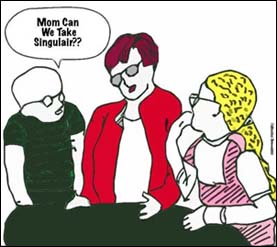 Did you or your children use the blockbuster asthma drug Singulair? World sales of Merck’s drug were about $5 billion a year until 2012 when its patent expired and it was the U.S.’s seventh best-selling drug. But last month, data from an FDA committee were presented that acknowledge “safety concerns” about “neuropsychiatric adverse events, including suicide and suicide attempts” with the drug.
Did you or your children use the blockbuster asthma drug Singulair? World sales of Merck’s drug were about $5 billion a year until 2012 when its patent expired and it was the U.S.’s seventh best-selling drug. But last month, data from an FDA committee were presented that acknowledge “safety concerns” about “neuropsychiatric adverse events, including suicide and suicide attempts” with the drug.
Singulair was used by almost 9 million patients, many under 16, in less than two years, according to FDA data. and four deaths are linked to it. Like Vioxx, Fosamax, Paxil and Ambien, now that the patent has run out on Singulair, its dangers are being acknowledged.
Singulair is one of several “asthma controller” drugs that debuted in the last few years that are supposed to be added on to rescue inhalers and inhaled corticosteroids instead of replacing them. In addition to the cost of adding a third drug to two drugs that are already used, Singulair cost almost $200 a month until it went off patent.
Last month’s concerns by an FDA committee are not the first time medical questions about Singulair have surfaced. Soon after its approval, FDA reviewers cautioned in the New England Journal of Medicine that adult studies of montelukast, Singulair’s generic name “may not be predictive of the response,” in children. In new drug approval documents from the 1990s hosted on the FDA website, reviewers note that Singulair levels in adolescents are different from “healthy adults,” and that an infant monkey, four weeks old, had to be euthanized because “infants may be more sensitive to the toxicity,” of Singulair. What? Three out of five guinea pigs also died from “severe anaphylactic responses.”
In clinical trials before Singulair’s safety was determined, scores of human subjects are reported to have withdrawn from trials because of “worsening” asthma and breathing problems. An asthma drug “worsens” asthma? Reviewers write that one study “demonstrates that it is better to leave patients on beclomethasone than to switch them to montelukast.” Beclomethasone, sold as Qvar, is a steroid to treat asthma. Approval documents include 10 blanked out pages, marked “This section was determined NOT to be releasable,” and the frequent phrase “Portions of this review were excerpted directly from the sponsor’s submission.”
William Busse, M.D., who chairs government expert panels on asthma despite listing 21 financial arrangements with drug companies, was involved in early Singulair testing and was issued an FDA warning letter when an inspection of his facility revealed incorrect consent forms, incorrect patient enrollments and drug inventory and labeling errors, according to FDA approval documents. Just good science.
Nor was Singulair marketed to children without controversy. Many considered Merck’s sales partnerships with Scholastic, a leading educational publishing group, and the American Academy of Pediatrics conflicts of interest. Sales materials urged parents to give their children Singulair for allergies and sports figures were used to further market the drug to children.
Parents become activists
What if your young son or daughter suddenly developed extreme behavior and emotional problems and even acted suicidal? What if your doctor misdiagnosed and mistreated the symptoms because neither you nor your doctor knew they were from the Singulair the child was taking? For more than five years, hundreds of parents, whose children suffered frightening side effects from Singulair, and drug safety activists have asked the FDA to acknowledge the problem. Finally, the FDA and medical community are validating the concerns.
Last month, the FDA’s Pediatric Advisory Committee called for clearer warnings of neuropsychiatric side effects on Singulair’s labels and for a “dear doctor” letter to be sent to health care professionals.
Leading the awareness campaign in the United States about Singulair dangers to children is Parents United for Pharmaceutical Safety and Accountability, founded by Jenna Markle, whose own son suffered from Singulair’s side effects. The group’s goals include raising awareness, better information and distribution channels about risks to consumers and professionals and opposing Merck’s attempt to sell the drug over-the-counter.
Reports of the harmful pediatric side effects of Singulair, which were first covered nationally by Fox News in 2009, have a chilling sameness. Toddlers who were put on the drug for sniffles or wheezing, develop unprecedented tantrums, fear and self-harm. Many parents report bed-wetting and repetitive motions/tics in their children from the drug. A parent posting a report last week on the Parents United website notes how “helpless” her tantrum-prone son is while he is “in the midst of a meltdown.” He has been on Singulair for three years, she says.
“I asked our new pediatrician (we moved) and she said for sure take him off Singulair, she hasn’t prescribed it in years because of that effect. I felt sick to my stomach and took him off immediately. It’s been four days of great behavior until tonight, tantrum came and that look in his eye was back. I’m hopeful he’s made improvements and that it’ll take some time for it to get back to the norm as well as learned behavior, but how long,” she writes.
This month a parent on askapatient reports her daughter “developed horrendously grotesque mouth contortions and hard eye blinking,” on Singulair. “It was disturbing and alarming to watch. We thought she had tourets syndrome [sic]. We did not make the connection until we ran out of meds and didn’t refill the script for almost 2 months over the summer. Her tics went away. Most recently, our daughter’s allergies flared up again and so on Monday we began giving her the montelukast again. Today, she started with the nodding and blinking tics once again. It has to be this medication.”
Hundreds of similar reports of Singulair’s effects on children have appeared on askapatient.com, the Parent United website and elsewhere online.
Luckily, the Parents United website offers a little reassurance about the symptoms. “With the exception of the children that we lost, our children experienced a remission of symptoms when they stopped taking Singulair,” says the site.
In 2009, I interviewed Kate Miller, a member of Parents United who had recently lost her 15-year-old son to suicide 17 days after he began taking Singulair for hay fever. He had been previously healthy and had no emotional problems. She told me she knew nothing about Singulair’s suicidal side effects until her sister found them on the Web and suspects the pediatrician didn’t either. Even as the Millers’ Queensbury, New York, community tried to process the death, ads ran on TV telling future Singulair users that “side effects are mild and vary by age.” Then New York representative, now senator, Kirsten Gillibrand assembled FDA representatives in her Washington, DC, office to hear the testimony of Kate and her husband Dave Miller.
Last month, I interviewed Jenna Markle, founder of Parents United, whose members have testified on Capitol Hill, before the FDA and the NIH and appeared on Good Morning America, The Early Show and Fox News. “There are parents working all over the world to raise awareness, uniting via the International Singulair Side Effects Action Group, founded by Australian activist Vanessa Sellick,” she told me. “Disturbingly, side effect information is not consistent on Singulair’s label from country to country. For example, in Canada and the Middle East, consumers are warned that asthma was reported in clinical trials as a drug related adverse experience in children. Why aren’t consumers in the United States entitled to receive this information?”
In addition to likely better warnings and “dear doctor” letters, there is another apparent victory in limiting harmful and only partially disclosed risks of Singulair. In May, the FDA Nonprescription Drugs Advisory Committee recommended the FDA not allow Merck’s request to sell Singulair over-the-counter. Parents United’s Jenna Markle and Jan Gilpin testified before the committee before its recommendation.
“We don’t know how Singulair causes such serious side effects. We don’t know if it can cause long-term problems in children. But we do know that children have been harmed by this medication. Until more research is conducted, Singulair should not be given to children unless absolutely necessary,” says Markle.
 Martha Rosenberg is a freelance journalist and the author of the highly acclaimed “Born With A Junk Food Deficiency: How Flaks, Quacks and Hacks Pimp The Public Health,” published by Prometheus Books. Check her Facebook page.
Martha Rosenberg is a freelance journalist and the author of the highly acclaimed “Born With A Junk Food Deficiency: How Flaks, Quacks and Hacks Pimp The Public Health,” published by Prometheus Books. Check her Facebook page.


